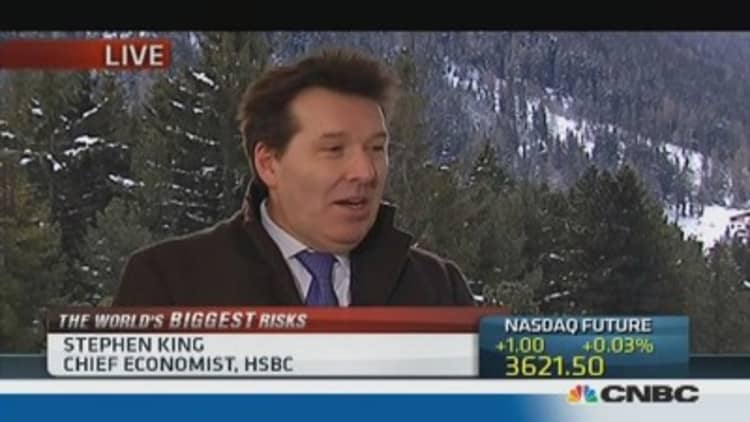Inflation in the euro zone fell more than expected in January to the level at which the European Central Bank last cut interest rates, as unemployment in the region remained stuck at 12 percent.
Consumer prices rose by 0.7 percent year-on-year in January, according to official statistics released by Eurostat - significantly below the 0.9 percent increase expected by economists.
(Read more: Euro zone money supply dries up, pressuring Draghi)
The figures are likely to give rise to more deflationary concerns, which were ignited when October's data showed inflation had fallen to a 47-month low of 0.7 percent. The concerns were not helped by December's lower-than-expected inflation figure of 0.8 percent.
Economists said the figures would up the pressure on the European Central Bank (ECB), which is due to will make its next monetary policy decision on Thursday, February 6. October's surprisingly low figures spurred the bank to cut its main interest rate to 0.25 percent from 0.5 percent.
"The latest euro zone unemployment and inflation data maintain the pressure on the ECB to do more to ward off deflation risks, perhaps as soon as next week," Capital Economics' Chief European Economist Jonathan Loynes said in a note.
"With the strong euro adding to deflation risks, the pressure on ECB President Mario Draghi to follow up his recent dovish words with further policy action is very strong."
While Howard Archer, chief European economist at IHS Global Insight, described the data as "worrying news for the ECB."
"While the ECB remains adamant that overall deflation is unlikely in the euro zone, it will be extremely uncomfortable with consumer price inflation coming back down to 0.7 percent," he said in a note.
As such, it looked increasingly possible that the bank would trim its refinancing rate to 0.10-0.15 percent, Archer added.
(Read more: Too soon to declare euro zone victory: Draghi)

Meanwhile, the unemployment rate for the euro zone came in at 12 percent for December - unchanged from November's 12 percent (which was revised down from earlier estimates of 12.1 percent). The number of jobless people in the region, however, fell by 129,000 - the largest monthly fall since the start of the financial crisis.
Investec Capital Markets analysts said in a note that the unemployment data was "hardly a strong signal of a turnaround in the euro zone."
But they added: "Considering we had 18 months of almost consistent hikes in the unemployment rate prior to 2013 (from 9.8 percent in June 2011 to 12 percent in December 2012), it is a strong sign that the euro zone has at least stemmed the bleeding."
(Read more: Euro zone economic recovery gathers steam?)
Archer agreed that although it was unclear that a decisive turnaround in euro zone labor markets was underway, they did look to have stabilized.
"Nevertheless, we suspect that with euro zone inflation set to remain very low for a prolonged period, bank lending to businesses continuing to fall markedly and the euro zone's recovery likely to remain gradual, the ECB is more likely than not to eventually take further action," he said.
"The ECB has indicated that it is particularly likely to act if there is an unwarranted rise in money market rates or if the medium-term inflation outlook moves lower."
With regards to those under the age of 25, December's youth unemployment rate was 23.8 percent, slightly lower than the 23.9 percent recorded for the same month in 2012.
In some countries, however, the youth jobless figures paint a more gloomy picture. The rate of unemployment is highest in Greece, at almost 60 percent and Spain, where it is at 54.3 percent.
—By CNBC's Katrina Bishop. Follow her on Twitter @KatrinaBishopand Google


